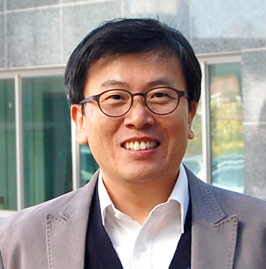Professor Kim, Hwa-Young of the College of Medicine Solves Mystery of Hearing Loss! N
No.88623- Writer YU
- Date : 2013.12.22 23:20
- Views : 9357
First in the world to elucidate the pathological mechanisms of hearing loss
Suggests new possibilities for treating hearing loss
[Nov 13, 2013]
Suggests new possibilities for treating hearing loss
[Nov 13, 2013]

Professor Kim, Hwa-Young (58) of the College of Medicine (Department of Biochemistry and Molecular Biology, photo) became the first in the world to explain the pathological mechanisms of hearing loss due to oxidative stress resulting from excessive active oxygen.
'Active oxygen' is oxygen that is excessively generated in various metabolic processes in the body that attacks biological tissues and damage cells. It is also called 'Oxygen free radical' and is known to be a major cause of aging. 'Oxidative stress' refers to the state of oxidation imbalance in the body due to excessive active oxygen.
Professor Kim became the first in the world to reveal how oxidative stress works to cause hearing loss. Using experimental mice, he explained the role of 'Methionine sulfoxide reductase B3 (MsrB3, the oxidative stress suppressing enzyme)' in the auditory system and how deficiency of it can cause hearing loss.
Professor Kim, who carried out the joint research with a research team from the Kyungpook National University School of Medicine developed the 'MsrB3' deficient rat model using genetic engineering techniques and confirmed the complete loss of hearing 20 days after birth. He proved that when there are no MsrB3 enzymes, the auditory hair cells in the cochlea was damaged quickly and that apoptotic cell death in cochlear hair cells occurred causing hearing loss.
'Methionine' is a proteinogenic amino acid and is easily oxidized by active oxygen, which then turns into methionine sulfoxide. Such oxidation of methionine can cause defects in protein structures and functions, but there is a cell restoration system that can restore oxidation of methionine in proteins back to normal. 'MsrB3' is in charge of this.
Professor Kim stated, "An important animal model has been established to study the effects of oxidative stress on hearing and this study proposes new possibilities for treating hearing loss through the adjustment of oxidation-reduction of methionine". He added, "Through additional collaborative research, we are planning to study the actual mechanisms of which MsrB3 deficiency causes stereocilia degeneration and apoptotic cell death in cochlear hair cells, while elucidating the relationship of oxidative stress and hearing loss using MsrB3 deficient animal models and other anti-oxidation enzyme animal models."
This research, which was carried out with the support of the advanced center of excellence project pursued by the Ministry of Science, ICT and Future Planning and the National Research Foundation of Korea and the support of the Ministry of Health & Welfare's disease oriented translational research project, was published in the online version of the prominent academic journal in genetics, 'Human Molecular Genetics' and will also be published offline in December.